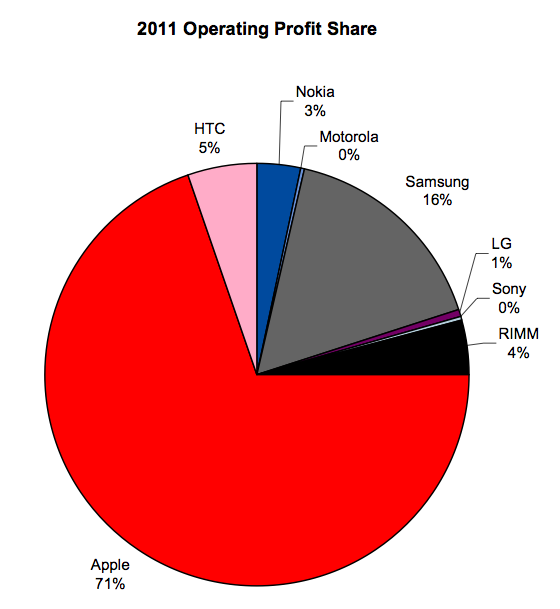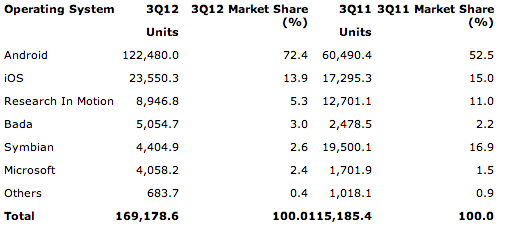Google chairman Eric Schmidt thinks his company is clearly winning the smartphone war with Apple and he goes on the record to say it in no ambiguous terms. The numbers certainly support Android’s position as the world’s most popular smartphone platform in terms of volume.
According to Gartner, both Samsung and Apple controlled nearly half the world’s smartphone market in the third quarter, or 46.5 percent. When it comes to mobile operating system share for smartphones, Android is in the clear lead with nearly three-quarters the market, or 72.4 percent, up from 52 percent in the year-ago quarter. Apple’s iOS held 13.9 percent. However, when it comes to the profits, Apple leads smart device profits and by a large margin, too…
Schmidt tells Bloomberg:
This is a huge platform change; this is of the scale of 20 years ago – Microsoft versus Apple. We’re winning that war pretty clearly now.
I like Peter Cohen’s response on The Loop blog:
In related news, Donald Trump thinks that Trump Steaks are the best-tasting steaks in the world and Jim Koch thinks Samuel Adams beer is the best beer.
Now, the very fact that Google’s chairman felt the urge to underscore that Android is winning could indicate a certain insecurity on Google’s part, if you ask me. Google, of course, knows that Apple’s platform is still the #1 choice for third-party developers and the biggest money-maker in mobile app revenue.
It’s nice to claim the world’s leading shipments, but then again the iPhone (along with the iPad in tablets) is still the world’s best-selling individual smartphone model which accounts for the vast majority of the mobile web traffic share.
More importantly, Apple owns the profits. In fact, if you ask people like Kantar, the iPhone in the US is beating Android to market share. Elsewhere, Apple’s handset is pretty much #1 in key usage statistics, the stuff like web share, e-commerce and so forth. Oh, and if Apple’s handset was irrelevant, T-Mobile wouldn’t be losing subscribers who wanted the iPhone.
This Citi chart contradicts Schmidt. Apple is clearly winning the profits game (via Fortune).
On the other hand, Google is not in the business of selling units and Schmidt acknowledges as much.
The core strategy is to make a bigger pie. We will end up with a not perfectly controlled and not perfectly managed bigger pie by virtue of open systems.
He also went on to defend Google’s tax avoidance in France, the U.K., Italy and Australia.
“It’s called capitalism”, he said. “We are proudly capitalistic. I’m not confused about this”.
And Google+, which has more than a hundred million active users, is a “viable competitor to Facebook”, Schmidt said.
Here’s an hour-long video interview with Bloomberg.
As for his Apple remarks, it’s true that the Play Store revenue has been on the rise lately as millions upon millions users go Android. On the other hand, Google is giving Android away to device vendors and its ownership with Motorola Mobility has yet to move the needle in terms of profitability.
Global mobile OS market share in Q3 2012. Source: Gartner (November 2012)
What the search firm is after are users’ eyeballs. To that extent, Android is clearly winning shipments, which indirectly benefits Google as the company gets to sell all those Android eyeballs to advertisers at a premium.
By the way, Google’s Motorola unit appears to have its sights set on Samsung, the biggest Android backer out there. A new Motorola ad campaign directly pits the flagship Razr phone against the Galaxy S III with a slogan of “It’s not easy. downloading… from another galaxy.”
Schmidt, 57, is increasingly becoming an unofficial spokesperson for the search giant.
Lately, the chairman has commented on a number of Apple’s missteps, from Mapgate to patent wars to Google’s relationship with Apple.
For instance, he noted last week how “extremely curious” it is that Apple has chosen to sue Google’s partners and not Google itself.
Android at large does not equally benefit Google and to suggest it does is false.
— ßen ßajarin (@BenBajarin) December 12, 2012
By the way, his open vs. closed remark from the above quote is really out of place, in my opinion.
Different things work for different people.
I may prefer Apple’s unmatched integration which by virtue stems from Apple’s tight control of every aspect of the user experience, but there are also people who like to tinker a lot with their devices and to them Android is probably a better choice.
Thoughts?



